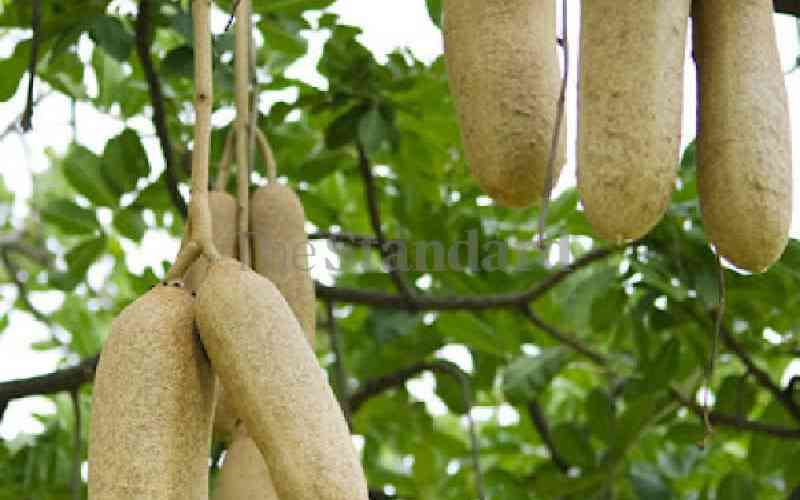
A man has filed a petition before the High Court to have two popular Akamba traditional brews legalised.
In a nine-page document, Augustus Muli, the patron of the Anzauni Ndene clan, observes that Kaluvu and Mawa brews were widely used in socio-cultural ceremonies.
Mawa is a millet beer while Kaluvu, also commonly known as kimee, is fermented brew using Muratina, a sausage tree fruit (Kigelia africana) and honey.
He listed the ceremonies such as rites of passage, reconciliations, dances, births, marriages, burials, and funeral celebrations, welcoming a guest, sealing a contract, agricultural cooperatives, thatching a roof among other areas and posed no health hazards.
The respondents in this case are the Cabinet Secretary, Ministry of Interior and Coordination of National Government, Prof. Kithure Kindiki, and the Attorney General, Justin Muturi.
Through lawyer Charles Mwalimu, the court is being sought to pronounce itself on licensing of the brews.
“The Respondents, under the guise of the Alcoholic Drink Control Act have made it impossible for the Akamba people to brew the aforementioned traditional drinks by imposing a requirement for manufacturing licensing whose conditions include a comprehensive proposal on the nature, orientation and other justification for the establishment of the alcoholic plant yet traditional brewers need simple local artefacts like gourds and barrels to brew the traditional beverages,” the petitioner states
Some of the ceremonies of the Akamba people stated to have been crippled by illegalising the brews include: ceremonies to appease ancestors by pouring the drink on the ground to “share” with ancestors for blessings and praying for rain.
They also listed its use by elders during traditional wedding ceremonies, and sealing marriage accords where a groom is supposed to give a dried gourd filled with “Kaluvu” together with honey and a blanket to the parents of the bride.
“When both sets of parents would share this drink, it was considered to indicate a sealing of the marriage accord. Friends will also take this drink together to show an agreement. As a homemade product mainly for rituals or special occasions, it was sold directly by brewers, but not in bars,” reads the petition.
In his arguments further, Mr. Muli tells the court that the Akamba community has suffered a “major injury” for a long time after declaration that the two drinks were illicit and they don’t conform to the Alcoholic Drink Control Act.
“The action by the Respondents to classify ‘mawa’ and ‘kaluvu’ as illicit discriminates against the Akamba people and violates their right to practice their culture thus putting it at the brink of extinction” he highlights.
To avert any toxicity in the entire manufacturing process, he wants the Court to give a declaration for office of the National Patron of the Anzauni Ndene Clan of Kenya to be the regulator of the brew.
Further, failure to have the brews legalised is said to have a continued discrimination against the community and thus violating the community’s rights in exercising their culture and risking extinction of same cultures.
He also questions the existence of foreign alcoholic drinks in the Country which are also traditional in their countries of origin.
“Foreign alcoholic drinks like Whiskey is Irish traditional drink, wine which is traditionally Italian, Vodka which is traditionally Russian but why continue to outlaw the sale and consumption of ‘mawa’ and ‘kaluvu’ thus discriminating against the Akamba People?” Muli questions pointing a finger at the respondents
In his defence of the Akamba traditional brews having no ill-health effects, he cites a Research study by the Faculty of Pharmacy, College of Health Sciences, University of Nairobi published in the East and Central African Journal of Pharmaceutical Sciences Vol. 1 No. 3, 1998 established that traditional alcoholic drinks.
The petitioner remains optimistic that just the way the high court declared Muratina not an illicit brew, allowing the Agikuyu people into its preparation and consumption, it will also take the same route.
The case will be mentioned on May 28, 2024 before Justice Elizabeth Karani.
 The Standard Group Plc is a multi-media organization with investments in media
platforms spanning newspaper print
operations, television, radio broadcasting, digital and online services. The
Standard Group is recognized as a
leading multi-media house in Kenya with a key influence in matters of national and
international interest.
The Standard Group Plc is a multi-media organization with investments in media
platforms spanning newspaper print
operations, television, radio broadcasting, digital and online services. The
Standard Group is recognized as a
leading multi-media house in Kenya with a key influence in matters of national and
international interest.









